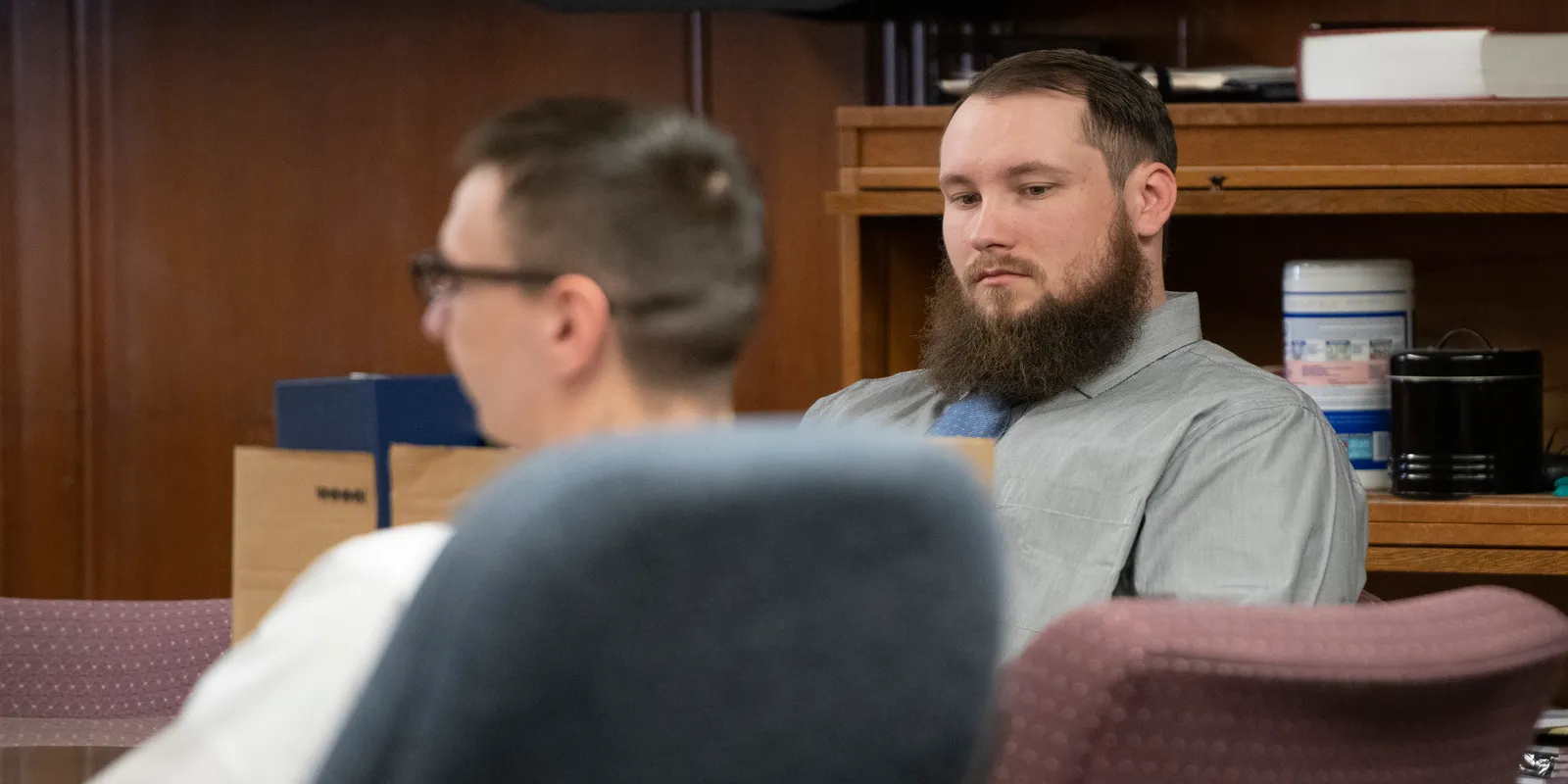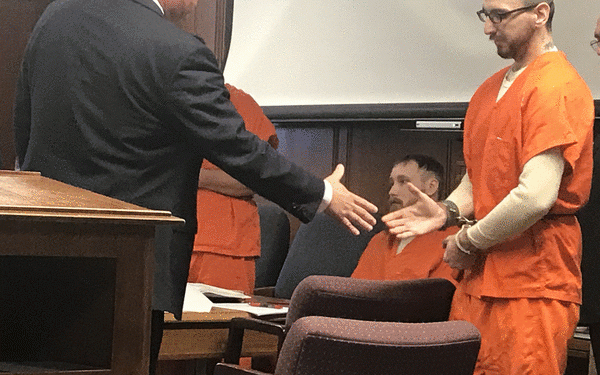A legal dispute has arisen between two men who were convicted in state court for aiding individuals who plotted to kidnap Governor Gretchen Whitmer. The men are currently in the midst of a protracted legal battle to obtain a clear explanation for why they were transferred to federal prison shortly after sentencing instead of being sent to a state prison.
In October 2022, Joseph Morrison, Paul Bellar, and Pete Musico, who were convicted of aiding the conspiracy, were sent to different federal prisons despite being charged at the state level. It is worth noting that Michigan’s prison system usually houses individuals convicted of state-level charges, not the federal penitentiary system.
Morrison and Bellar’s appellate attorneys have been battling for months to reverse their transfers, claiming that there was never a clear explanation provided as to why they were necessary. Their imprisonment in federal facilities in Pennsylvania and Illinois has also hampered their ability to build an appeal. Musico, on the other hand, is currently in West Virginia and does not seem to have contested his transfer, unlike Morrison and Bellar.
In Jackson County Circuit Court on Friday, attorneys Michael Faraone and Ronald Ambrose contended that their clients were deprived of their rights when mailed paperwork was sent back to them before they had the opportunity to review it. Furthermore, Zoom calls with their clients were repeatedly canceled, and there is no evidence that the prisoners were given access to the Michigan legal library resources that are typically available to those appealing their convictions.
During a court session with Jackson County Circuit Judge Thomas D. Wilson, Faraone, who alongside Ambrose, serves as a court-appointed attorney through the Michigan Appellate Assigned Counsel System, stated that moving the individuals out of state was done in a vindictive manner.
In December 2022, Bellar and Morrison were found guilty of being part of a gang and aiding a terrorist act. The charges were related to allegations that they conducted firearms training with the alleged leaders behind a kidnapping plot, Adam Fox and Barry Croft. Morrison was given a minimum sentence of 10 years, while Bellar received a seven-year sentence. Musico, meanwhile, was handed a sentence of at least 12 years in prison.
According to court filings, it seems that the state’s argument that the men were transferred to federal prisons due to security concerns may not be entirely accurate. The records suggest that plans for federal prison housing had been made even before the men had gone through the Michigan Department of Corrections’ security risk review process and prior to their sentencing.
The Department of Corrections’ Assistant Attorney General, Keith Clark, contended on Friday that the extensive media coverage on the case has given the men a high level of notoriety, posing a security risk in Michigan prisons. Clark argued that prisons are a reflection of society and the current political division could potentially cause security concerns among prisoners who are either for or against the men.
On Friday, Clark stated that due to the infamous reputation and social divide, relocating them outside of Michigan was the safest option. He confirmed that this was the ultimate decision.
The MDOC had been resisting requests to bring the men back to Michigan for almost 10 months. However, a court order was issued, compelling them to return for appeal hearings, and they finally made it back to the state in recent weeks. Morrison had to spend a week in administrative segregation, commonly referred to as solitary confinement, at MDOC before being moved to the general population at the Jackson County jail, according to Faraone.

Faraone and Ambrose have raised concerns about the agreement made by the Department of Corrections to keep the men in the state during their appeals. They argue that the agreement lacks clarity and fails to compensate for the period during which these men did not have proper access to their attorneys and appeal materials.
According to Bellar’s representative, Ambrose, he has had more communication with his client in the past week than in the previous two years.
‘The situation is abhorrent’
This Article Includes
At the end of Friday’s hearing, the focus was on the state’s attempt to prevent discussions on the federal prison housing. However, Wilson’s ruling made it clear that he did not have the authority to make decisions related to how the state houses its prisoners. This meant that Faraone and Ambrose would not be able to depose the Department of Corrections leaders regarding the transfer decision, had Wilson allowed a hearing on the matter.
Wilson acknowledged the potential interest in the matter but agreed with the state lawyers that he lacked jurisdiction over it. He stated, “I think it would be interesting, but I have to agree with you.”
Currently, Faraone and Ambrose have an ongoing case against the state prison department in the Michigan Court of Claims. This case was filed after they were unable to make any progress in the Jackson County Circuit Court. The objective of the case is to request similar relief for their clients. The Michigan Department of Corrections and Director Heidi Washington are the defendants in this lawsuit.
In February, the Department of Corrections requested the Court of Claims to dismiss the case. However, five months have passed, and Judge Christopher Yates has not yet ruled on the motion. On behalf of Morrison, Faraone filed an inmate grievance last Friday for the duration when the Department of Corrections kept Morrison in administrative segregation for a week. Faraone also indicated that he would file another lawsuit if Morrison is put in solitary confinement again without a clear explanation.
Faraone and Ambrose presented their case in the Court of Claims, claiming that they faced communication barriers with Morrison and Bellar. They further argued that the federal prisons were not facilitating the delivery of mail from their lawyers, nor were they providing adequate telecommunication options, such as Zoom. Additionally, the prisoners maintained that the Michigan law library legal materials, which are mandated under state law, were not available to them. Moreover, they even alleged that a third party had been eavesdropping on certain phone calls.
According to Morrison and Bellar’s attorneys, despite the efforts made by Attorney General Dana Nessel’s office to assist in communication between the appellate lawyers and their clients, no progress has been made.
In a court filing, the appellate attorneys expressed their distress over the fact that the Michigan Attorney General has no authority over the Federal Bureau of Prisons (BOP). They also stated that it is unfair for appellate counsel to have to work with and go through the prosecution to communicate with their clients. The attorneys called this situation abhorrent.
During the court hearing on Friday, Clark expressed his frustration towards the constant grievances and pointed out that he had never encountered any complaints from prisoners who were transferred to federal prison, which is widely recognized as a safer option than state prison. Clark also condemned the persistent complaints regarding the prolonged federal stay, highlighting that Morrison and Bellar have already returned to Michigan.
Clark said to the judge, “We provided them with what they asked for. Pursuing anything further would be nothing but seeking revenge or holding a grudge against the defense counsel or the Attorney General’s Office of the Michigan Department of Corrections.”
‘Crimes against our governor’
Faraone and Ambrose have filed documents in Jackson County Circuit Court, alleging that the Michigan Department of Corrections provided false information regarding the prisoners’ transfer to the federal penitentiary. The attorneys claim that they have been misled and kept waiting for better access to their clients.
For months, the MDOC had maintained that the transfer of Morrison and Bellar to federal prisons was necessary due to safety concerns for both the facility and the defendants.
Recently, defense attorneys obtained an email dated Dec. 13, 2022, from Laura Heinritz, the State Administrative Manager of MDOC. In the email, Heinritz informed a staff member that Morrison, Bellar, and Musico will soon receive their sentences and that the Department of Corrections wants them to be sent to the Federal Bureau of Prisons (FBOP).
According to the court filing, the men underwent the MDOC security risk review on December 16, two days after they were sentenced.
According to the filing, on Dec. 19, 2022, Heinritz wrote an email to a Bureau of Prisons employee with the subject line “Michigan seeking federal placement.”
In the emails, it is requested that Bellar, Morrison, and Musico be placed under federal custody, citing the severity of their crimes against the governor. The request also emphasizes the need for expedited federal consideration.
According to Faraone, the emails serve as evidence that the transfers were not carried out for security reasons, but rather as a means of retaliation.
According to Faraone’s filing, the transfers happened simply because “our governor” was believed to be the victim. He argues that this motive goes against the core values of our legal system.
In November 2023, Faraone made a public records request to the Department of Corrections to obtain emails related to the transfer of state crime inmates to federal prisons. As a result, he was able to procure the emails. However, the MDOC requested a payment of $1,000 for copies of the public records, but has not yet provided any evidence of similar transfers.



